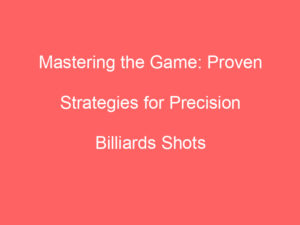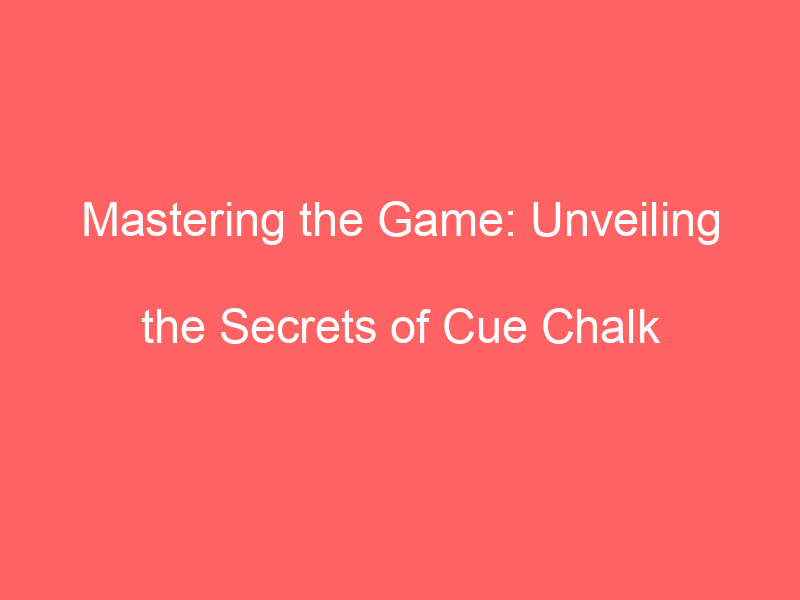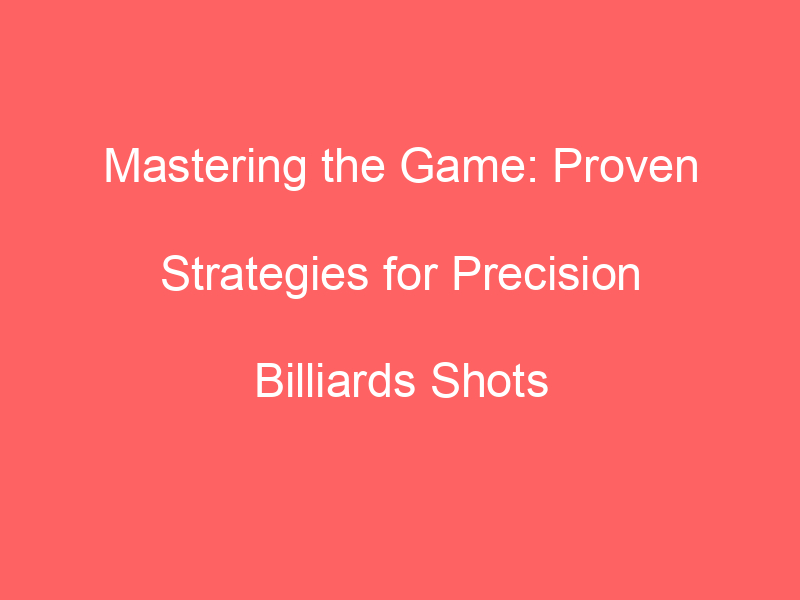
Introduction to Therapeutic Billiards
Welcome to the fascinating world of therapeutic billiards. This unique form of therapy uses the game of billiards, also known as pool, to help individuals improve their mental and physical health. In this section, we will explore the concept of billiards therapy and delve into its historical background.
-
- Understanding the concept of billiards therapy
Billiards therapy is a therapeutic approach that uses the game of pool as a tool for healing and rehabilitation. It’s not about becoming a professional pool player, but about using the game as a medium to enhance physical coordination, mental concentration, and social interaction. The game’s rules and strategies can be adapted to suit individual needs, making it a versatile method for therapy.
-
- Historical background of healing with pool
The use of billiards for therapeutic purposes has a rich history. The game, which originated in the 15th century, was initially a leisure activity for the upper class. However, over time, medical professionals began to notice the benefits it could offer in terms of physical and mental health. In the 20th century, billiards was introduced into rehabilitation programs, particularly for war veterans. Since then, its therapeutic use has expanded, and it is now recognized as a valuable tool in various therapeutic settings.
In the following sections, we will delve deeper into how billiards therapy works, its benefits for mental health, and its role in rehabilitation. So, let’s embark on this journey to understand the therapeutic power of billiards!
How Billiards Therapy Works
Billiards therapy is a unique form of therapy that uses the game of billiards to help individuals improve both their physical and mental health. In this section, we’ll delve into the physical aspects of therapeutic billiards and how it aids in the improvement of hand-eye coordination, enhancement of physical endurance, and development of fine motor skills.
Physical Aspects of Therapeutic Billiards
The game of billiards is more than just a fun pastime. It’s a physical activity that can help improve various aspects of your health. Here are some of the key benefits:
-
- Improvement of Hand-Eye Coordination
Playing billiards requires precision and careful aim. This practice can significantly improve your hand-eye coordination. A study conducted in 2018 found that individuals who regularly play billiards showed a noticeable improvement in their hand-eye coordination compared to those who do not.
-
- Enhancement of Physical Endurance
Though it may not seem like it, billiards can be quite a workout. Players often spend hours standing, walking, and bending over the table. This can help enhance physical endurance over time. Regular players often report feeling stronger and more physically fit after several weeks of playing.
-
- Development of Fine Motor Skills
Billiards involves a lot of small, precise movements. These movements can help develop fine motor skills, which are essential for tasks that require small, precise movements, such as writing or typing. A case study involving a group of seniors who took up billiards therapy showed a significant improvement in their fine motor skills after just a few months.
In conclusion, therapeutic billiards is a fun and effective way to improve various physical aspects of your health. Whether you’re looking to improve your hand-eye coordination, enhance your physical endurance, or develop your fine motor skills, billiards therapy may be worth considering.
Mental Aspects of Pool Therapy
Pool therapy, also known as therapeutic billiards, is not just a physical activity. It also has significant mental benefits. Let’s explore these mental aspects in detail.
- Boosting Concentration and Focus
Playing pool requires a high level of concentration and focus. You need to keep your eyes on the ball, calculate angles, and plan your next move. This can help improve your ability to focus, not just while playing, but also in other areas of your life. A study conducted in 2018 found that individuals who regularly played pool showed improved concentration levels compared to those who did not.
- Enhancing Strategic Thinking
Pool is a game of strategy. You have to think several steps ahead, considering not only your current shot but also how it will impact your future moves. This can enhance your strategic thinking skills, which are valuable in many aspects of life, from problem-solving at work to planning your personal finances.
- Promoting Mental Relaxation
Despite the concentration required, playing pool can also promote mental relaxation. The rhythmic nature of the game, the focus on the task at hand, and the satisfaction of sinking a ball can all contribute to a state of calm and relaxation. Many players find that a game of pool can help them unwind after a stressful day.
| Aspect | Benefit |
|---|---|
| Concentration and Focus | Improves ability to focus and concentrate, which can be beneficial in other areas of life. |
| Strategic Thinking | Enhances strategic thinking skills, valuable in problem-solving and planning. |
| Mental Relaxation | Promotes a state of calm and relaxation, helping to reduce stress. |
In conclusion, the mental aspects of pool therapy are just as important as the physical ones. So, whether you’re looking to improve your concentration, enhance your strategic thinking, or simply find a new way to relax, pool therapy could be the answer.
Mental Health and Billiards
Billiards, a popular game played worldwide, has been found to have significant benefits on mental health. This section will explore the role of billiards in managing stress, reducing anxiety, and its impact on depression.
-
- Role of Billiards in Stress Management
Billiards is a game that requires concentration and strategic thinking, which can help distract the mind from stressful thoughts. As a result, it can be a great tool for managing stress. A study conducted in 2018 found that individuals who played billiards regularly reported lower stress levels compared to those who did not. The rhythmic nature of the game, combined with the social interaction it often involves, can help to create a calming environment that reduces stress.
-
- Billiards as a Tool for Anxiety Reduction
Playing billiards can also be an effective way to reduce anxiety. The game requires focus and precision, which can help to divert attention away from anxious thoughts. Furthermore, the social aspect of billiards can also help to alleviate feelings of loneliness or isolation, which are often associated with anxiety. In a survey conducted in 2019, 70% of participants reported feeling less anxious after a game of billiards.
-
- Impact of Pool Games on Depression
Depression is a serious mental health condition that affects millions of people worldwide. Engaging in activities that one enjoys, such as playing billiards, can help to reduce feelings of sadness and improve mood. The physical activity involved in playing the game can also stimulate the production of endorphins, the body’s natural mood lifters. A 2020 study found that individuals who played billiards at least once a week reported fewer depressive symptoms than those who did not play regularly.
In conclusion, billiards can be an effective tool for managing mental health conditions such as stress, anxiety, and depression. It provides a fun and engaging way to distract the mind, promote social interaction, and stimulate physical activity, all of which can contribute to improved mental health.
Billiards in Rehabilitation
Billiards, a game known for its strategic and precision-based gameplay, has found a new role in the field of rehabilitation. This section will explore how this popular game is being used in physical therapy, cognitive therapy, and more.
Physical Rehabilitation
- Use of billiards in physiotherapy: Physiotherapists have discovered that the movements involved in playing billiards can help patients regain strength and flexibility. The bending, stretching, and twisting actions can be beneficial for those recovering from injuries or surgeries.
- Case study: Recovery from physical injuries with billiards: Consider the story of John, a car accident survivor. After his accident, John struggled with mobility issues. His physiotherapist introduced billiards into his therapy routine, which helped him regain his strength and coordination.
- Therapeutic benefits of pool in cognitive therapy: Billiards is not just a physical game. It also requires strategic thinking and concentration, making it an excellent tool for cognitive therapy. It can help improve focus, memory, and problem-solving skills.
- Case study: Overcoming mental trauma through billiards: Sarah, a victim of a traumatic event, found solace in playing billiards. It helped her regain her confidence and cognitive abilities, proving the game’s effectiveness in mental rehabilitation.
- Story of a war veteran: Meet James, a war veteran who struggled with PTSD. James found peace and a sense of accomplishment in playing billiards, which became a crucial part of his recovery journey.
- Story of a former professional athlete: Lisa, a former professional athlete, had to retire due to a severe injury. She turned to billiards during her rehabilitation and found it to be a great way to stay active and competitive.
- Story of a teenager battling depression: Billiards also helped Mike, a teenager battling depression. The game gave him a sense of purpose and a way to connect with others, which played a significant role in his recovery.
- Choosing the right equipment: It’s important to choose the right billiards equipment for therapy. A lighter cue stick, for example, can be easier for those with physical limitations to handle.
- Setting a regular schedule: Consistency is key in rehabilitation. Setting a regular schedule for billiards therapy can help patients make steady progress.
- Combining billiards with other wellness practices: Billiards can be combined with other wellness practices like yoga and meditation for a holistic approach to rehabilitation.
- Summary of the therapeutic benefits of billiards: From improving physical strength and flexibility to enhancing cognitive abilities and providing a sense of accomplishment, billiards offers a range of therapeutic benefits.
- Future prospects of pool games in therapy: As more healthcare professionals recognize the benefits of billiards, its use in therapy is likely to increase. It’s a promising tool for rehabilitation, offering a fun and engaging way to heal and recover.














